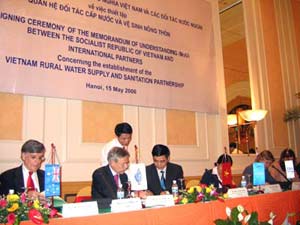14 partners help Vietnam in clean and rural areas

14 partners are international organizations and NGOs participated in the signing ceremony
Ministry of Agriculture and Rural Development, donors and non-governmental organizations signed a Memorandum of Understanding on Rural Water Supply and Sanitation Partnership on May 15, and set up a Coordination Office. under Ministry of Agriculture and Rural Development.
Minister of Agriculture and Rural Development Cao Duc Phat and ambassadors, chief representatives of international organizations in Vietnam such as the World Bank (WB), East Asia and Pacific Water and Sanitation Program, UNICEF Vietnam, Asian Development Bank, embassies of Australia, Denmark, Sweden, the Netherlands . have signed this memorandum.
The Rural Water Supply and Sanitation Partnership will be operational from May 5, focusing on supporting policy dialogue, information sharing and research at local, national and regional levels. . At the same time, the partnership also supports the implementation of sectoral initiatives that have been agreed upon in the Partnership Program Framework as well as promoting sector access through mutual trust funds.
Mr. Klaus Rohland, WB Director in Vietnam, said that the goal of the Partnership is to contribute to poverty alleviation, to increase income for rural people and to protect the environment through more effective implementation of War. National Strategy on Rural Water Supply and Sanitation, as well as other relevant government strategies and policies.
The partnership has contributed to enhancing the efficiency of resource use in the rural water supply and sanitation sector through the development of a coordination mechanism to coordinate and harmonize environmental program policies. National school for rural water supply, sanitation and other programs.
According to Jesper Morch, UNICEF Representative in Vietnam, the world now has over 1 billion people without clean water to use and 2.6 billion people do not have access to sanitation programs. In Vietnam, water resources are limited and are currently under serious pressure before pollution and excessive water use are widespread.
This is the combined effect of factors such as population booms, increased economic activities and inadequate management. In addition, the gap in access to water between provinces has become more pronounced. The proportion of households with access to clean water in urban areas is 78%, while this rate in rural areas is only 44%.
The current challenge is enormous when Vietnam sets a target to provide 85% of the overall demand for clean water by 2010 and 100% by 2020.
- Rural or urban: Where is the freshest and most livable place?
- Rare picture of life in rural Vietnam in 1993 (Part 2)
- Rare picture of life in rural Vietnam in 1993 (Part 1)
- Ericsson expanded GSM network with Vietnamese partners
- Places with the most expensive clean water in the world
- The locust's love changes because of the noise
- AusAID grants clean water to poor people in the Mekong Delta
- Rural students are better at science
- Why do rural women often give birth to larger children?
- Clean internet is the desire of Ben Tre people
- How to narrow the digital gap for rural areas?
- Living in the countryside, growing up with animals will help us less depressed
 Vietnam 5th Asian champion on fuel-efficient vehicles
Vietnam 5th Asian champion on fuel-efficient vehicles We can read all NASA studies completely free of charge
We can read all NASA studies completely free of charge Singer and songwriter Bob Dylan won the 2016 Nobel Prize for Literature
Singer and songwriter Bob Dylan won the 2016 Nobel Prize for Literature Scientific revolution in Asia
Scientific revolution in Asia